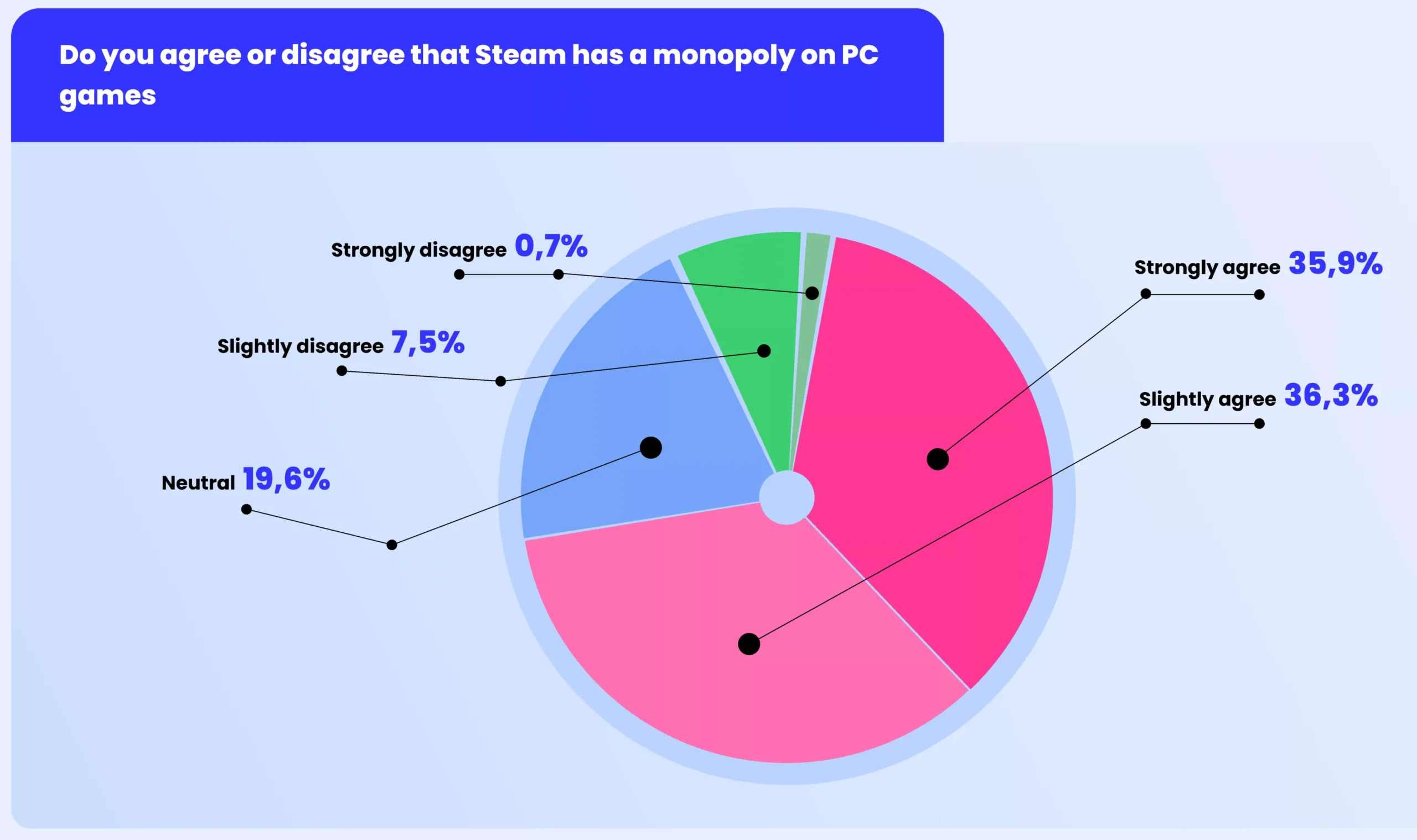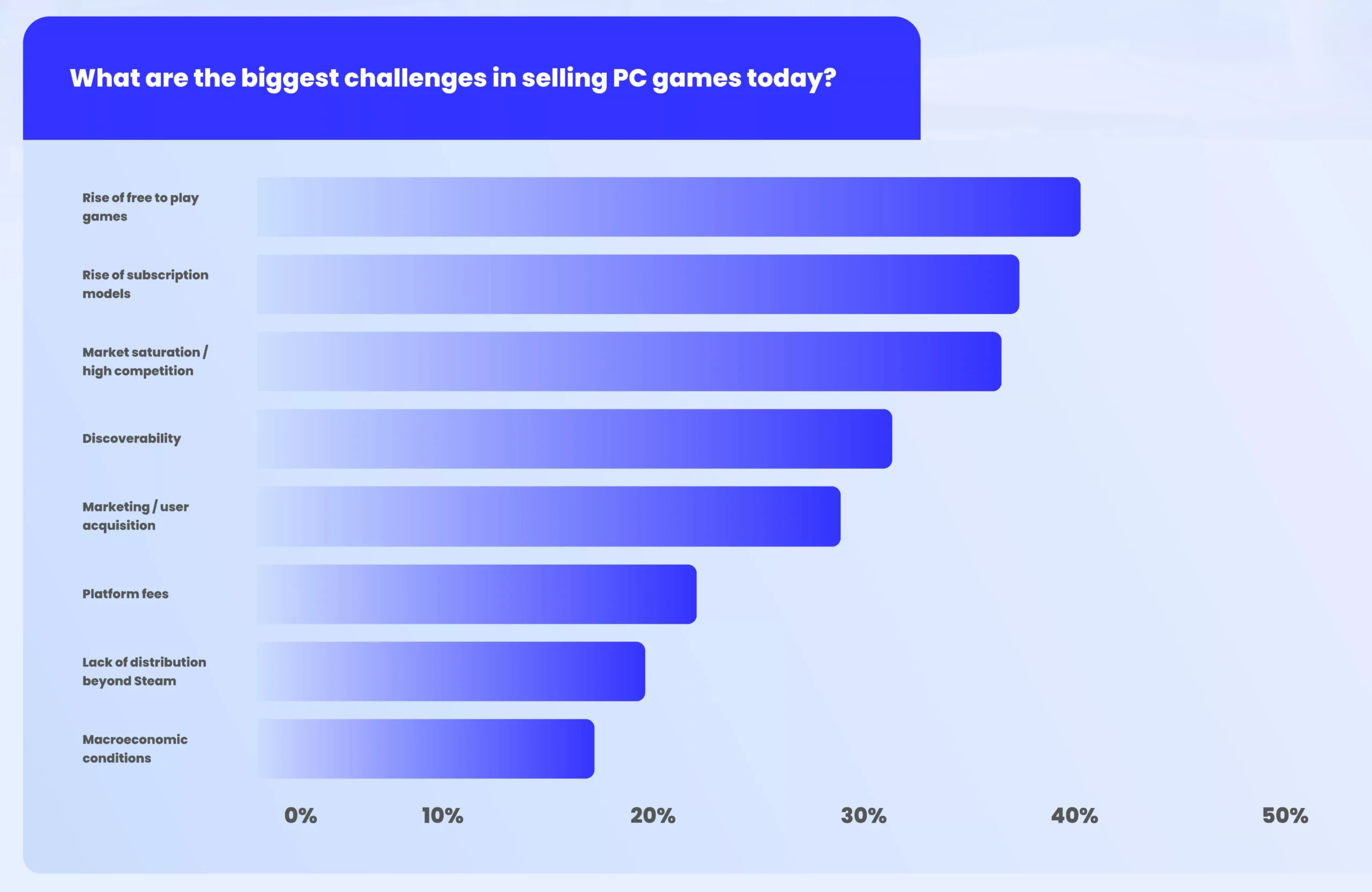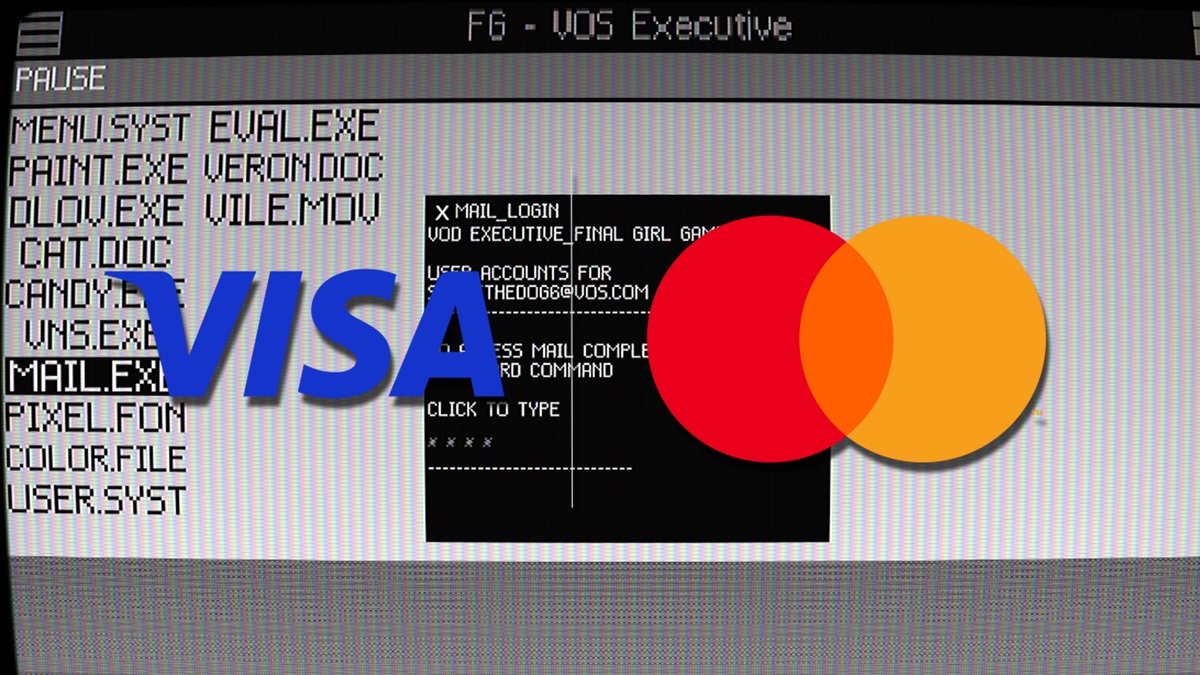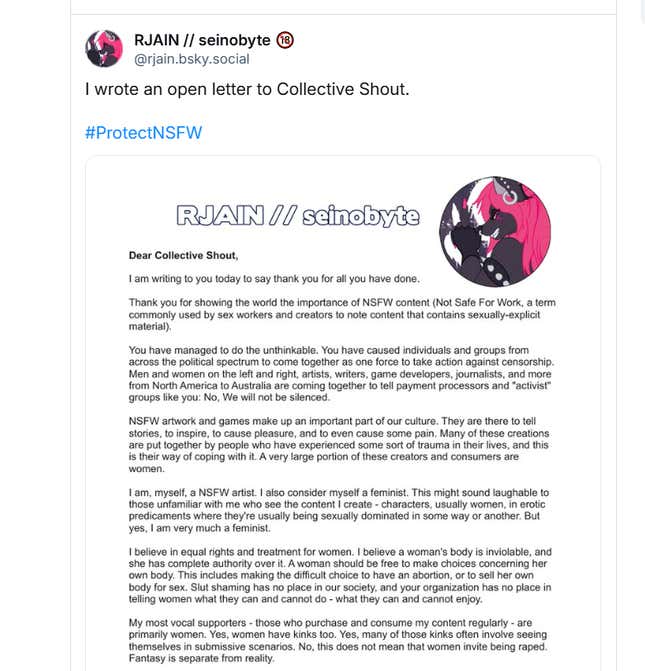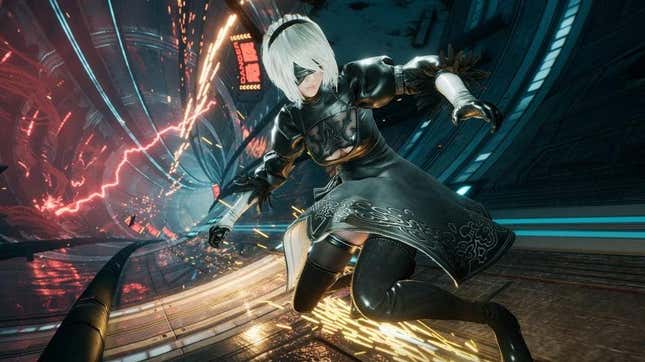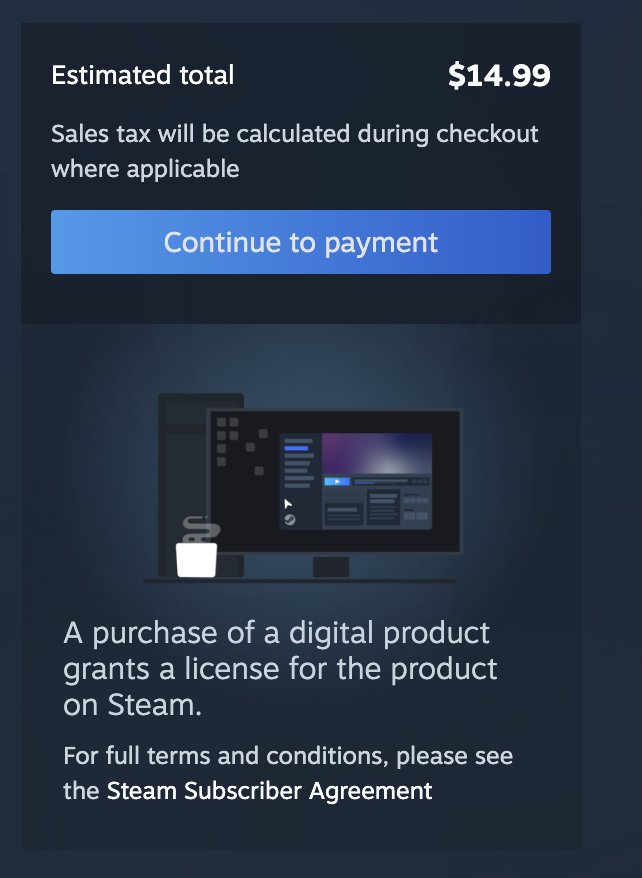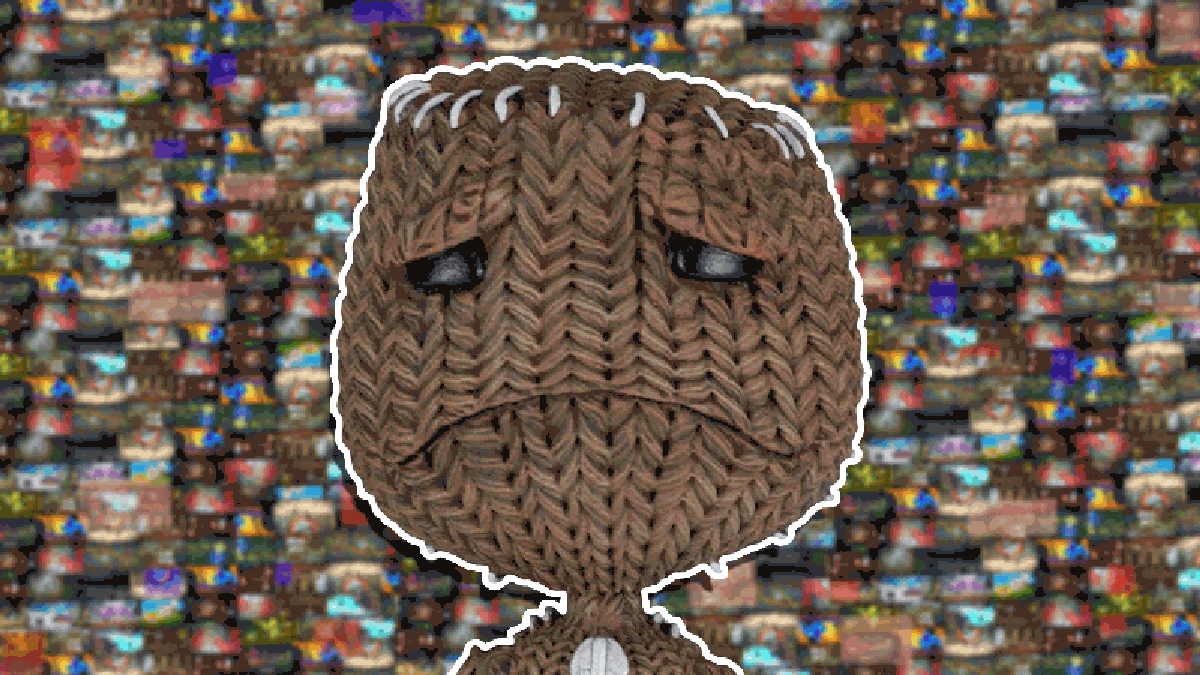A week or so ago, Karl Bode wrote about Vice Media’s idiotic decision to disappear several articles that had been written by its Waypoint property concerning Collective Shout. Collective Shout is an Australian group that pretends to be a feminist organization, when, in reality, it operates much more like any number of largely evangelical groups bent on censoring any content that doesn’t align with their own viewpoints (which they insist become your viewpoints as well). The point of Karl’s post was to correctly point out that Collective Shout’s decision to go after the payment processors for the major video game marketplaces over their offering NSFW games shouldn’t be hidden from the public in the interest of clickbait non-journalism.
But that whole thing about Collective Shout putting on a pressure campaign on payment processors is in and of itself a big deal, as is the response to it. Both Steam and itch.io recently either removed or de-indexed a ton of games they’re labeling NSFW, chiefly along guidelines clearly provided by the credit card companies themselves. Now, Collective Shout will tell you that it is mostly interested in going after games that depict vile actions in some ways, such as rape, child abuse, and incest.
No Mercy. That’s the name of the incest-and-rape-focused game that was geo-blocked in Australia this April, following a campaign by the local pressure group Collective Shout. The group, which stands against “the increasing pornification of culture”, then set its sights on a broader target – hundreds of other games they identified as featuring rape, incest, or child sexual abuse on Steam and itch.io. “We approached payment processors because Steam did not respond to us,” said the group of its latest campaign.
The move was effective. Steam began removing sex-related games it deemed to violate the standards of its payment processors, presenting the choice as a tradeoff in a statement to Rock Paper Shotgun: “We are retiring those games from being sold on the Steam Store, because loss of payment methods would prevent customers from being able to purchase other titles and game content on Steam.”
Itch.io followed that up shortly afterwards with its de-indexing plan, but went further and did this with all NSFW games offered on the platform. Unlike Steam, itch.io was forthcoming as to their reasoning for its actions. And they were remarkably simple.
“Our ability to process payments is critical for every creator on our platform,” Corcoran said. “To ensure that we can continue to operate and provide a marketplace for all developers, we must prioritize our relationship with our payment partners and take immediate steps towards compliance.”
Digital marketplaces being unable to collect payment through trusted partners would be, to put it tersely, the end of their business. Those same payment processors can get predictably itchy about partnering with platforms that host content that someone out there, or many someones as part of a coordinated campaign, may not like for fear that will sully their reputation. And because these are private companies we’re talking about, their fear along with any of their own sense of morality are at play here. The end result is a digital world filled with digital marketplaces that all exist under an umbrella of god-like payment processors that can pretty much dictate to those other private entities what can be on offer and what cannot.
And, as an executive from Appcharge chimed in, the processors will hang this all on the amount of fraud and chargebacks that come along with adult content, but that doesn’t change the question about whether payment processors should be neutral on legal but morally questionable content or not. Because, as you would expect, the aims of folks like Collective Shout almost certainly don’t end with things like rape and incest.
It’s possible that Collective Shout’s campaign highlighted a level of operational and reputational risk that payment processors weren’t aware of, and of a severity they didn’t expect. “I’m guessing it’s also the moral element,” Tov-Ly says. “It just makes sense, right? Why would you condone incest or rape promoting games?”
Tov-Ly is of the opinion that payment processors offer a utility, and should have no more role in the moral arbitration of art than your electricity company – meaning, none at all. “Whenever you open that Pandora’s box, you’re not impartial anymore,” he says. “Today it’s rape games and incest, but tomorrow it could be another lobbying group applying pressure on LGBT games in certain countries.”
We’ve already seen this sort of thing when it comes to book and curriculum bans that are currently plaguing far too much of the country. When porn can mean Magic Treehouse, the word loses all meaning.
What is actually happening is that payment processors are feeling what they believe is “public pressure”, but which is actually just a targeted and coordinated campaign from a tiny minority of people who watched V For Vendetta and thought it was an instruction manual. Well, the public has caught wind of this, as have game publishers that might be caught up in this censorship or whatever comes next, and coordinated contact campaigns to payment processors to complain about this new censorship are being conducted.
Gilbert Martinez had just poured himself a glass of water and was pacing his suburban home in San Antonio, Texas while trying to navigate Mastercard’s byzantine customer service hotline. He was calling to complain about recent reports that the company is pressuring online gaming storefronts like Steam and Itch.io to ban certain adult games. He estimates his first call lasted about 18 minutes and ended with him lodging a formal complaint in the wrong department.
Martinez is part of a growing backlash to Steam and Itch.io purging thousands of games from their databases at the behest of payment processing companies. Australia-based anti-porn group Collective Shout claimed credit for the new wave of censorship after inciting a write-in campaign against Visa and Mastercard, which it accused of profiting off “rape, incest, and child sexual abuse game sales.” Some fans of gaming are now mounting reverse campaigns in the hopes of nudging Visa and Mastercard in the opposite directions.
If noise is what is going to make these companies go back to something resembling sanity, this will hopefully do the trick. We’re already seeing examples of games that are being unjustly censored, described as porn when they are very much not. Not to mention instances where nuance is lost and the “porn” content is actually the opposite.
Vile: Exhumed is a textbook example of what critics of the sex game purge always feared: that guidelines aimed at clamping down on pornographic games believed to be encouraging or glorifying sexual violence would inevitably ensnare serious works of art grappling with difficult and uncomfortable subject matter in important ways. Who gets to decide which is which? For a long time, it appeared to be Steam and Itch.io. Last week’s purges revealed it’s actually Visa and Mastercard, and whoever can frighten them the most with bad publicity.
Some industry trade groups have also weighed in. The International Game Developers Association (IGDA) released a statement stating that “censorship like this is materially harmful to game developers” and urging a dialogue between “platforms, payment processors, and industry leaders with developers and advocacy groups.” “We welcome collaboration and transparency,” it wrote. “This issue is not just about adult content. It is about developer rights, artistic freedom, and the sustainability of diverse creative work in games.”
This is the result of a meddling minority attempting to foist their desires on everyone else, plain and simple. Choking the money supply is a smart choice, sure, but one that should be recognized in this case for what it is: censorship based on proclivities that are not widely shared. And if there really is material in these games that is illegal, it should obviously be done away with.
But we should not be playing this game of pretending content that is not widely seen as immoral should somehow be choked of its ability to participate in commerce.



